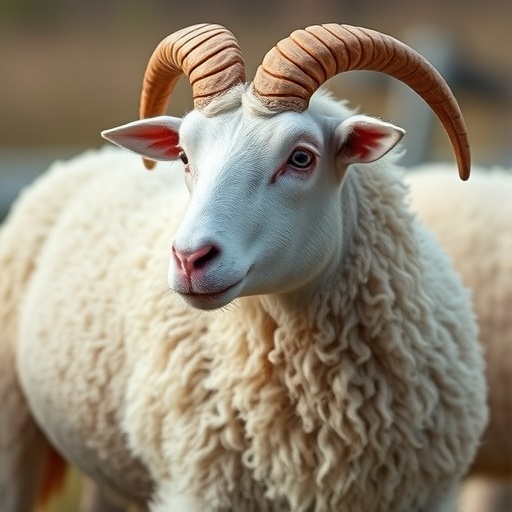A landmark study involving untargeted metabolomics analysis has unveiled critical insights into the comparative meat quality of various muscles in Dolang sheep (Ovis aries). Conducted by a team of researchers led by Anwar, A., along with Fu, X., and Tang, S., this investigation sheds light on how feeding practices, particularly in saline-alkali land, can profoundly influence the biochemical composition and palatability of sheep meat. The findings not only enhance our understanding of animal husbandry practices but also have potential ramifications for the meat industry and consumer health.
The significance of this research stems from the pressing need to optimize livestock production systems that are not only efficient but also sustainable. In regions where saline-alkali land predominates, farmers face unique challenges in raising livestock. The study explores how the nutritional elements in the feed impact both the metabolic profile of the sheep and ultimately, the quality of the meat produced. By utilizing advanced untargeted metabolomics techniques, the researchers were able to identify a range of metabolites associated with muscle quality.
In the livestock sector, muscle quality is often assessed based on various parameters, including flavor, texture, and nutritional content. This research provides important data that can lead to improved practices in sheep farming. The implications are far-reaching, as enhanced meat quality could influence meat prices, consumer preferences, and nutritional outcomes. Understanding the metabolic pathways impacted by specific feeding practices enables farmers to make better-informed decisions regarding animal diets.
One of the pressing issues in the field of animal husbandry is how environmental conditions affect livestock health and product quality. Dolang sheep, a native breed known for its hardiness, are subject to a variety of ecological pressures. The study delves deeply into how saline-alkali land influences not only the health of the sheep but also the biochemical makeup of their muscles. Notably, the research indicates that certain feeding regimens on saline-alkali land may enhance the meat’s aroma compounds, contributing to its overall sensory profile.
The researchers employed sophisticated analytical tools to gauge the metabolites found in the various muscles of Dolang sheep. This untargeted metabolomics approach allows for a more holistic view of how different environmental conditions and feeding practices influence livestock. By analyzing muscle tissue samples, they discovered that certain metabolites correlated strongly with desirable meat quality traits. This data serves as a vital reference point for future studies aimed at optimizing livestock production methods.
The study’s findings indicate marked differences between muscles in terms of their metabolic profiles, which influences not just meat quality but also the overall health of the livestock. This is a crucial factor for farmers aiming for high-quality produce that meets market demands. The integration of metabolomics into livestock studies represents an innovative approach, enriching the field with data that can facilitate improved breeding and feeding strategies for livestock.
Moreover, the implications of this research extend into the realm of consumer health. With a growing focus on food quality and safety, the ability to enhance meat quality through informed feeding practices aligns with increasing public demand for high-nutrient, tasty foods. This tailored approach to livestock nutrition could lead to healthier meat options that appeal to a broader audience.
As the global meat market becomes more competitive, producers must find viable ways to differentiate their products. The insights gained from this study provide a path toward unique selling propositions, particularly for farmers raising sheep in challenging environments. By enhancing muscle quality through targeted feeding strategies, farmers can elevate their products and potentially capture higher market prices.
During the research, a comparative analysis was conducted that employed various sampling techniques to ensure a comprehensive understanding of the metabolic variations among the different muscle types in Dolang sheep. The study emphasizes the importance of localized approaches to livestock nutrition and management practices that consider the unique agricultural conditions of each region. Such region-specific strategies could prove indispensable in meeting the demands of both local and global markets.
The study illustrates a critical intersection between environmental conditions, animal welfare, and agricultural productivity. Greater awareness of how saline-alkali lands affect sheep health and meat quality can galvanize stakeholders, leading to improvements in animal husbandry practices. By engaging with this dynamic, researchers and farmers alike can influence policies conducive to sustainable livestock production.
In conclusion, Anwar et al.’s study stands as a pivotal contribution to the field of animal science and livestock management. Through meticulous research, they have unveiled significant connections between feeding practices, environmental influences, and muscle quality traits in Dolang sheep. This work not only enhances the scientific community’s understanding of metabolomics but also presents farmers with actionable insights to improve the quality of their meat products in an environmentally and economically sustainable manner.
The implications of these findings are vast, suggesting that with the right approaches, it is possible to yield superior meat without compromising animal welfare or environmental integrity. As further research builds on these findings, it will be fascinating to see how these insights evolve and influence the future of livestock production worldwide.
Subject of Research: Comparative meat quality of different muscles in Dolang sheep and the impact of saline-alkali land feeding.
Article Title: Untargeted metabolomics analysis reveals comparative meat quality of different muscles and the impact of Saline-alkali land feeding on Dolang sheep (Ovis aries).
Article References:
Anwar, A., Fu, X., Tang, S. et al. Untargeted metabolomics analysis reveals comparative meat quality of different muscles and the impact of Saline-alkali land feeding on Dolang sheep (Ovis aries).
BMC Genomics 26, 782 (2025). https://doi.org/10.1186/s12864-025-12008-8
Image Credits: AI Generated
DOI:
Keywords: Metabolomics, meat quality, Dolang sheep, saline-alkali land, animal husbandry, livestock production.




